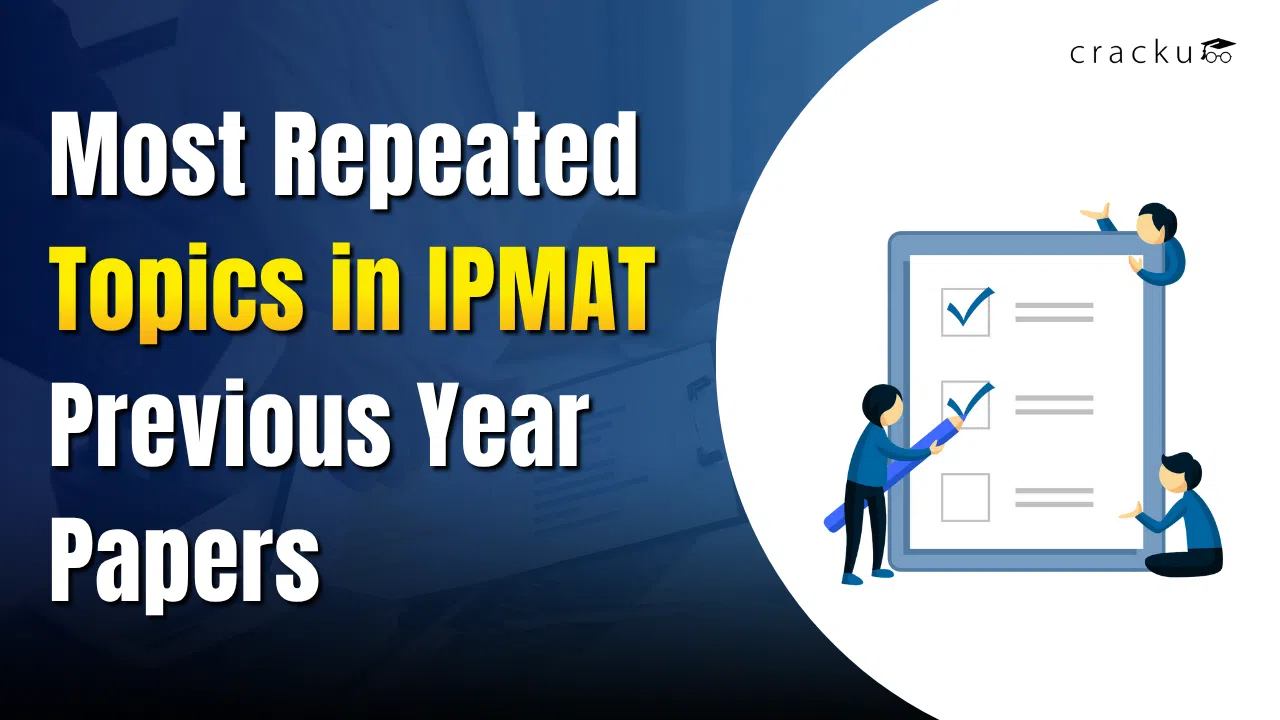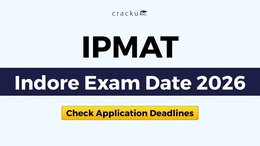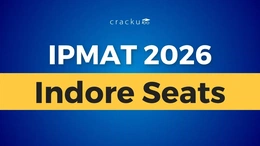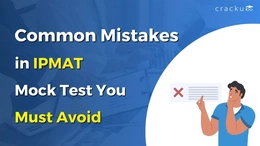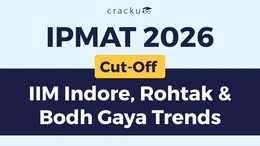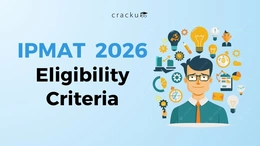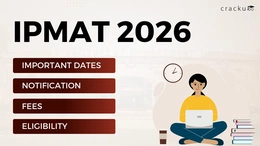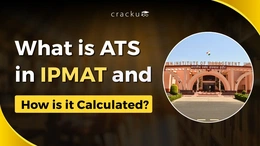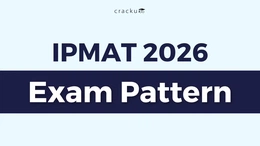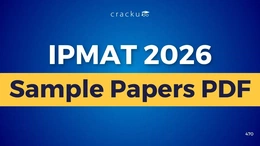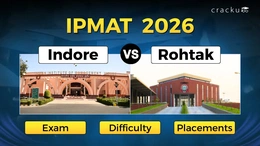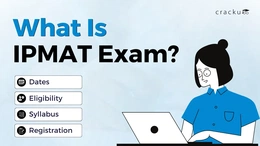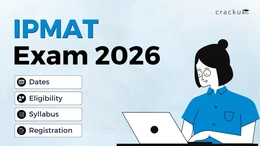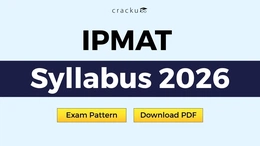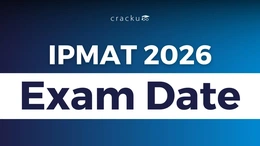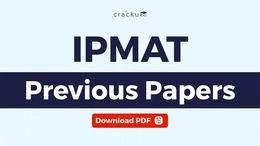IPMAT Previous Year Papers
Analyzing IPMAT Previous Year Papers is the most critical step. Why? These papers are a blueprint for the IPMAT Indore exam. They show the structure, question types, and common topics.
Practicing with IPMAT Previous Year Papers is the best way to prepare. It helps you manage time. You find high-weightage topics. You build confidence for the real test.
The IPMAT Indore exam is 120 minutes long. Two hours total. It has three sections. Each section has a strict time limit.
- Verbal Ability (VA): 45 questions.
- Quantitative Ability (QA) - MCQ: 30 questions.
- Quantitative Ability (QA) - Short Answer: 15 questions.
Each section gets exactly 40 minutes.
Most Repeated Topics in IPMAT Exam
The most repeated topics are Algebra and Reading Comprehension. These two areas are the core of the exam. They carry the most weight in the Quant and Verbal sections.
A review of past papers proves this. A large part of the test comes from these topics every year.
For the Quant section, math from Classes 11 and 12 is key. For the Verbal section, the focus is on understanding passages and vocabulary. Not just pure grammar.
Quantitative Ability (Repeated):
- Algebra (Linear, Quadratic Equations)
- Logarithms
- Permutation & Combination
- Set Theory
- Percentages, Profit & Loss
- Time, Speed & Distance
Verbal Ability (Repeated):
- Reading Comprehension (Passages)
- Vocabulary (Synonyms, Antonyms)
- Idioms & Phrases
- Para Jumbles
- Error Spotting (Grammar)
Also Read, IPMAT Indore Syllabus 2026, Exam Pattern, Important Topics
IPMAT Important Topics
The most important topics are the high-yield ones. These carry the maximum weightage.
For the Quant section, Algebra is the most important area. Reports show 12 or more questions come from Algebra every year.
For Verbal Ability, Reading Comprehension is critical. It often makes up 40% of the entire section. Focus on the topics below. This is the best strategy for a high score.
Quantitative Ability (High-Yield):
- Algebra (12+ Qs), including Functions, Equations, Logarithms
- Geometry & Mensuration (Recent trend shows 7-8 Qs)
- Permutation & Combination (approx. 2 Qs)
- Set Theory (approx. 2 Qs)
- Arithmetic (Percentage, P&L;, TSD)
Verbal Ability (High-Yield):
- Reading Comprehension (12-18 Qs)
- Vocabulary (approx. 10 Qs)
- Para Jumbles (approx. 5 Qs)
- Paracompletion (approx. 5 Qs)
IPMAT Topic-Wise Weightage
The topic-wise weightage is focused on Algebra and Reading Comprehension. Algebra dominates the Quant sections. Reading Comprehension dominates the Verbal section.
The full exam has 90 questions. It is worth 360 total marks. It also has strict 40-minute sectional timings.
You must understand how questions are distributed. The Verbal Ability section has the most questions (45). This means speed is essential. The QA-SA section is different. It has no negative marking, which changes your strategy.
Section-wise Weightage:
- Verbal Ability (VA): 45 Questions (180 Marks)
- Quantitative Ability (QA) - MCQ: 30 Questions (120 Marks)
- Quantitative Ability (QA) - SA: 15 Questions (60 Marks)
Key Topic Weightage (Approximate):
- Reading Comprehension: 12-18 questions
- Total Algebra: 12+ questions
- Total Vocabulary: 10+ questions
- Para Jumbles: 5 questions
- Paracompletion: 5 questions
- Geometry & Mensuration: 3-8 questions (trending up)
Also Read, IPMAT Sample Papers 2026, Practice Tests for Indore & Rohtak
IPMAT Quant Important Topics
The most important quant topics are grouped into four areas. Algebra (Higher Maths), Arithmetic, Modern Math, and Geometry.
Paper analysis shows that over 60% of the Quant section comes from Class 11 and 12 math.
Algebra and Modern Math (like P&C; and Set Theory) are always high-yield. Arithmetic is the foundation. And Geometry has seen its weightage increase recently.
Algebra:
- Linear and Quadratic Equations
- Logarithms
- Inequalities
- Functions & Graphs
- Sequence & Series (AP/GP)
Modern Math:
- Permutation & Combination
- Probability
- Set Theory
- Binomial Theorem
Arithmetic:
- Percentages, Profit & Loss
- Time, Speed & Distance (including Boats & Streams)
- Time & Work
- Averages, Ratios, and Mixtures
Geometry & Mensuration:
- Triangles, Circles, and Quadrilaterals
- Coordinate Geometry
- Mensuration (Area & Volume)
Also Read, IPMAT Formula PDF, Download Quant Formula Sheet PDF
IPMAT Verbal Important Topics
The most important verbal topics are Reading Comprehension and Vocabulary.
The Verbal Ability (VA) section is often called the easiest of the three. But it is also "moderate but lengthy".
This section is a high-speed test. It tests your comprehension and vocabulary in context. It is not a deep test of complex grammar rules. Questions about RC and Vocabulary fill the section.
Reading Comprehension (Highest Priority):
- RC Passages: Usually 3 passages with 12-18 questions total.
- Question Types: Focus on Main Idea, Author's Tone, Inference, and finding the meaning of phrases in the passage.
Vocabulary:
- Synonyms & Antonyms
- Idioms & Phrases
- Phrasal Verbs
- Confusing Words / Correct Word Usage
- Sentence Completion (Fillers)
Logical Reasoning (Verbal):
- Para Jumbles (approx. 5 questions)
- Para completion (approx. 5 questions)
Grammar (Lower Priority):
- Error Spotting / Sentence Correction (approx. 4-5 questions)
- Topics: Tenses, Prepositions, Modifiers, Noun & Pronoun Errors.
IPMAT Previous Year Question Trend
The main trend is "unpredictability". That is the key.
Exam setters change the weightage of topics. They do this to stop students from only studying past trends. A topic that was minor one year could be major the next year.
What does this mean? You must prepare for the entire syllabus. A complete strategy is essential.
Still, some clear macro-trends have appeared.
- Reduced Arithmetic Weightage: Recent exams have fewer Arithmetic questions. One analysis noted "only 4 questions from arithmetic" in 2025.
- Increased Geometry Weightage: At the same time, there was a "Sudden Increase in Geometry Questions". The 2025 paper had 7 geometry questions. The previous average was only 3-4.
- Increased RC Weightage: The Verbal section now focuses more on comprehension. It has a "Higher Weightage for Reading Comprehension". The 2025 paper even included a surprise third RC passage.
- Consistent Difficulty Pattern: The difficulty for each section usually stays the same.
- QA-MCQ: This is the hardest section. 2025 was called "extremely hard". 2024 was "difficult and time-consuming".
- QA-SA: This section has no negative marking. It is usually "easy and high-scoring" or "moderate".
- Verbal Ability: This is "the easiest" section. It is made to test speed and accuracy.
Also Take, IPMAT Mock Test
IPMAT Previous Year Papers: Conclusion
Preparing for IPMAT requires focusing on high-weightage topics such as Algebra, Reading Comprehension, and Geometry. By practicing with previous year papers, you’ll understand the exam’s structure and identify the most repeated topics. Prioritizing these areas will give you a significant edge in the exam, helping you to score better and manage time efficiently.
It’s important to keep a balanced approach and not neglect any section. Regular practice in Quantitative Ability, Verbal Ability, and Logical Reasoning will ensure that you are well-prepared to tackle any surprise questions that may come your way. Remember, consistency is key to cracking IPMAT with a high score.
